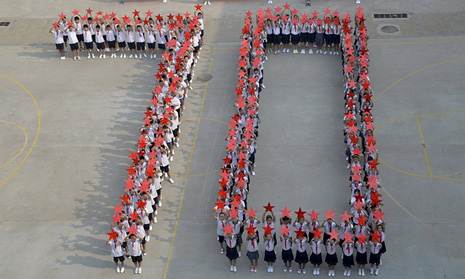Ban’s office said he was aware of concern in Japan, which believes the UN should remain neutral on the commemoration of historical events and has voiced “strong displeasure” over his attendance in a message sent through it mission to the UN.
Ban, a former South Korean foreign minister, was quoted by China’s Xinhua news agency as saying: “China’s contribution and sacrifice during the second world war is very much recognised, [and China] is appreciated for all such sufferings, and sympathised [with] by the world’s people.
“It is important to look to the past, what kinds of lessons we have been learning, and how we can move ahead to a brighter future based on the lessons learned. That is the main purpose.”
About 12,000 troops, 500 armoured vehicles, conventional and nuclear weapons and 200 aircraft are expected to take part in the parade in Tiananmen Square, the scene of the government’s bloody suppression of pro-democracy protests in 1989.
Xinhua said about 1,000 foreign troops from 17 other countries would also appear.
Last week Japan’s prime minister, Shinzo Abe, abandoned efforts to arrange a bilateral summit with his Chinese counterpart, Xi Jinping, in Beijing just before or after the parade.
Officials in Tokyo said Abe was busy overseeing the passage of controversial security legislation, but he was reportedly concerned that his attendance could be interpreted as tacit acceptance of China’s military build-up in disputed areas of the South China sea and its claims to the Senkakus, a group of uninhabited islands administered by Japan in the East China sea.
Most other Western leaders, including Barack Obama and David Cameron, have declined invitations to the parade, which many see as an attempt to showcase China’s military might rather than to commemorate the end of the war.
Thursday will mark 70 years and a day since Japan formally announced its unconditional surrender to the allies, just over two weeks after its wartime defeat on 15 August 1945.
The South Korean president, Park Geun-hye, and the Russian leader, Vladimir Putin, will attend, as will Choe Ryong-hae, a close aide to the North Korean leader Kim Jong-un.
Although the parade is being touted as a celebration of China’s victory in the “war of resistance against Japanese aggression” and fascism, Chinese officials insist the event will not be used to demonise Japan.
“I’d like to reaffirm that the commemorations do not target any specific country, neither today’s Japan nor the Japanese people in general,” China’s deputy foreign minister, Zhang Ming, said.
Japan’s wartime conduct is still the cause of widespread resentment in China and on the Korean peninsula, where many believe it has failed to properly atone for atrocities it committed on the Asian mainland in the first half of the 20th century.
Japanese media seized on China’s poor human rights record to accuse it of hypocrisy in urging Japan to learn from its past mistakes.
The Xi administration, the Asahi Shimbun said in an editorial, “continues to place top priority on sovereignty while putting little importance on human rights. Its approach to ruling the nation is reminiscent of the totalitarianism that raged in the world until the end of the war 70 years ago”.
More about:
















































